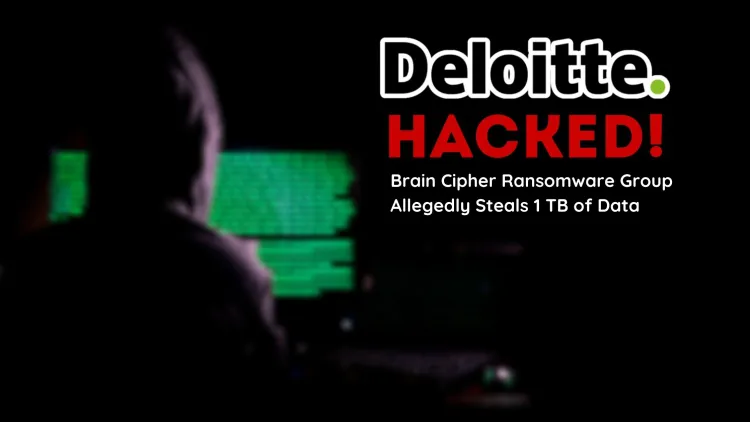Deloitte Hacked: Brain Cipher Ransomware Group Allegedly Steals 1 TB of Data
Deloitte, one of the largest professional services firms globally, has been targeted by the Brain Cipher ransomware group in a major cyberattack that reportedly occurred in December 2024. The group claims to have stolen 1 terabyte of sensitive data, including client records, employee details, and internal communications. Using advanced tactics like phishing and exploiting vulnerabilities, they not only accessed Deloitte's systems but also threatened to expose the stolen data unless their demands were met. This breach highlights significant risks, such as financial losses from investigation costs, non-compliance fines, and reputational damage. Deloitte may also face legal challenges from affected parties. The incident underscores the growing sophistication of cyber threats and the urgent need for businesses to enhance their cybersecurity defenses, conduct regular audits, train employees, and maintain secure data backups to mitigate the impact of such attacks.

In a shocking turn of events, Deloitte, one of the world’s largest professional services firms, has fallen victim to a major cyberattack. The Brain Cipher ransomware group claims responsibility for this attack, alleging they have stolen a massive 1 terabyte (TB) of sensitive data. This news has sent ripples through the cybersecurity and business communities, raising serious questions about data security and corporate defenses against cyber threats.
Who is the Victim?
Deloitte is a global leader in consulting, audit, tax, and advisory services. is a global leader in consulting, audit, tax, and advisory services. With a reputation for working with top-tier clients, including Fortune 500 companies and government organizations, Deloitte handles highly sensitive information. This makes them a prime target for cybercriminals seeking to exploit valuable data.
What Happened?
The Brain Cipher ransomware group, a relatively new but highly active threat actor in the cybersecurity world,, a relatively new but highly active threat actor in the cybersecurity world, claims to have breached Deloitte’s defenses. This attack reportedly occurred in early December 2024. According to reports, the group not only stole the data but also left messages indicating their intent to expose sensitive information if their demands were not met. They leveraged advanced tactics, including phishing and exploiting unpatched vulnerabilities, to gain unauthorized access to Deloitte’s systems.
What Data Was Stolen?
Although the specifics of the stolen data have not been officially confirmed, ransomware groups typically target:
-
Client Information: Confidential data from Deloitte’s corporate clients, including financial records and strategic plans. Confidential data from Deloitte’s corporate clients, including financial records and strategic plans.
-
Employee Information: Personal details, including emails, phone numbers, and possibly payroll data. Personal details, including emails, phone numbers, and possibly payroll data.
-
Internal Communications: Emails and documents that could reveal sensitive business operations. Emails and documents that could reveal sensitive business operations.
The exposure of such data could have devastating consequences for Deloitte and its clients, ranging from financial losses to reputational damage.
The Impact on Deloitte
Financial Losses: Cyberattacks often lead to significant financial consequences,
Cyberattacks often lead to significant financial consequences, including:
-
Costs of investigating and mitigating the breach.
-
Potential fines for non-compliance with data protection regulations like GDPR.
-
Loss of business due to diminished client trust.
Reputation Damage:
Deloitte’s reputation as a trusted advisor and security-conscious organization is at risk. Clients may question the firm’s ability to safeguard their data, leading to strained relationships or loss of business.
Legal Consequences:
Deloitte may face lawsuits from clients and regulatory bodies if negligence in protecting data is proven.
Who is the Brain Cipher Ransomware Group?
The Brain Cipher ransomware group is part of a growing wave of cybercriminal organizations is part of a growing wave of cybercriminal organizations that use ransomware to extort money from victims. These groups typically:
-
Encrypt the victim’s data to make it inaccessible.
-
Threaten to release or sell stolen data unless a ransom is paid.
Brain Cipher’s tactics align with this pattern, as they have reportedly demanded a ransom for the safe return of Deloitte’s data. They also claimed that failure to pay would result in the public release of the stolen information.
How Can Such Attacks Be Prevented?
The Deloitte breach serves as a wake-up call for organizations worldwide. To prevent similar incidents, companies must:
-
Strengthen Cybersecurity Measures: Implement robust firewalls, intrusion detection systems, and multi-factor authentication.
-
Employee Training: Educate employees about phishing attacks and safe online practices.
-
Regular Audits: Conduct frequent security assessments to identify and fix vulnerabilities.
-
Backup Data: Maintain secure, offline backups of critical data to minimize the impact of ransomware.
Conclusion
The alleged Deloitte data breach is a stark reminder of the growing sophistication of cyber threats. While the full extent of the damage remains uncertain, the incident underscores the need for constant vigilance in the digital age. Organizations must prioritize cybersecurity to protect themselves and their clients from devastating attacks.
The story of Deloitte and the Brain Cipher ransomware group will likely continue to unfold, shedding more light on the evolving nature of cybercrime and the measures required to combat it.












![Top 10 Ethical Hackers in the World [2025]](https://www.webasha.com/blog/uploads/images/202408/image_100x75_66c2f983c207b.webp)

![[2025] Top 100+ VAPT Interview Questions and Answers](https://www.webasha.com/blog/uploads/images/image_100x75_6512b1e4b64f7.jpg)









